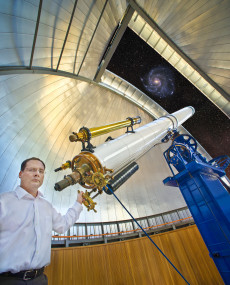Peter Nugent Appointed Division Deputy for Scientific Engagement
June 3, 2014
Contact: Linda Vu, +1 510 495 2402, lvu@lbl.gov
Peter Nugent has been appointed Deputy for Scientific Engagement in Berkeley Lab’s Computational Research Division (CRD). In his new role, Nugent will work with CRD and Computing Sciences leadership to develop and implement a strategy for engaging with other Berkeley Lab scientific divisions in need of computational solutions for data-intensive science projects. He will also act as a facilitator for these inter-divisional collaborations.
“Peter’s role as the Division Deputy for Scientific Engagement will leverage the leading role he has played over the last two decades in helping transform cosmology and astrophysics by taking advantage of the latest high performance computing resources to maximize the science from these data intensive fields,” says CRD Director David Brown.
As the former lead of the National Energy Research Scientific Computing Center’s (NERSC’s) Analytics Group, Nugent also brings a deep understanding of the roles that NERSC and CRD play in the emerging field of data-intensive science. As Deputy for Scientific Engagement, Nugent will be engaging with government stakeholders, including Department of Energy (DOE) headquarters, and other national laboratories to develop the Scientific Data Facilities (SDF) concept.
With advancements in cost-effective detector and imaging technologies, scientists are collecting more data than ever before. This information has the potential to transform our world. Humanity’s next revolutionary renewable energy source may be buried in the petabytes of information (quadrillion bytes) currently stored at public genome repositories. However, this deluge of data can also be debilitating as researchers struggle to store, analyze and visualize it to find the useful “nuggets” that could lead to a scientific breakthroughs. Ideally, the SDF would leverage the expertise of renowned mathematicians and computer scientists in CRD, as well as supercomputing resources at NERSC and the Energy Sciences Network (ESnet) to help scientists work through these data-intensive science challenges.
Nugent began his career at Berkeley Lab as a member of the Supernova Cosmology Project, led by 2011 Nobel Laureate in Physics Saul Perlmutter. The project used NERSC supercomputers to perform thousands of supernova simulations, which ultimately helped astronomers make the first measurements that confirmed the Universe’s expansion is accelerating. Nugent subsequently co-founded the Computational Cosmology Center in CRD.
More recently, Nugent architected the Palomar Transient Factory (PTF) data pipeline, which currently holds the world record for discovering new astrophysical transients, like supernovae. He is also principal investigator for the development of Nyx code used to perform large adaptive mesh refinement hydrodynamical + n-body simulations. Nyx will help scientists analyze data from “dark universe” surveys like Berkeley Lab’s Baryon Oscillation Spectroscopic Survey (BOSS) and Dark Energy Spectroscopic Instrument (DESI).
Nugent has authored over 180 refereed publications. He has received numerous career awards including Berkeley Lab’s Director’s Award for Exceptional Scientific Achievement; NERSC Award for Innovative Use of High Performance Computing; Supercomputing Conference’s (SC09) Storage Challenge Award; and the Gruber Prize in Cosmology in 2007. A wide range of news organizations and publications have featured his work including the BBC, CNN, NPR, the PBS News Hour, NASA’s Space Science Update program, Nature, Newsweek, Science, Space.com and Time Magazine.
Although he will continue his research activities in cosmology and astrophysics, as well as maintain a role in NERSC’s Data and Analytics Services Group, Nugent will step down as lead of CRD’s Computational Cosmology Center (C3). He will continue as acting lead of C3 until a replacement is named.
About Berkeley Lab
Founded in 1931 on the belief that the biggest scientific challenges are best addressed by teams, Lawrence Berkeley National Laboratory and its scientists have been recognized with 16 Nobel Prizes. Today, Berkeley Lab researchers develop sustainable energy and environmental solutions, create useful new materials, advance the frontiers of computing, and probe the mysteries of life, matter, and the universe. Scientists from around the world rely on the Lab’s facilities for their own discovery science. Berkeley Lab is a multiprogram national laboratory, managed by the University of California for the U.S. Department of Energy’s Office of Science.
DOE’s Office of Science is the single largest supporter of basic research in the physical sciences in the United States, and is working to address some of the most pressing challenges of our time. For more information, please visit energy.gov/science.










